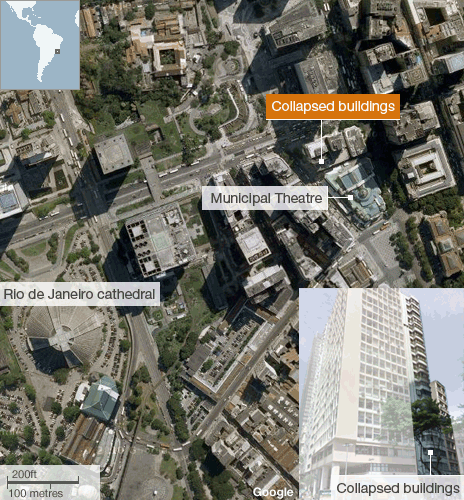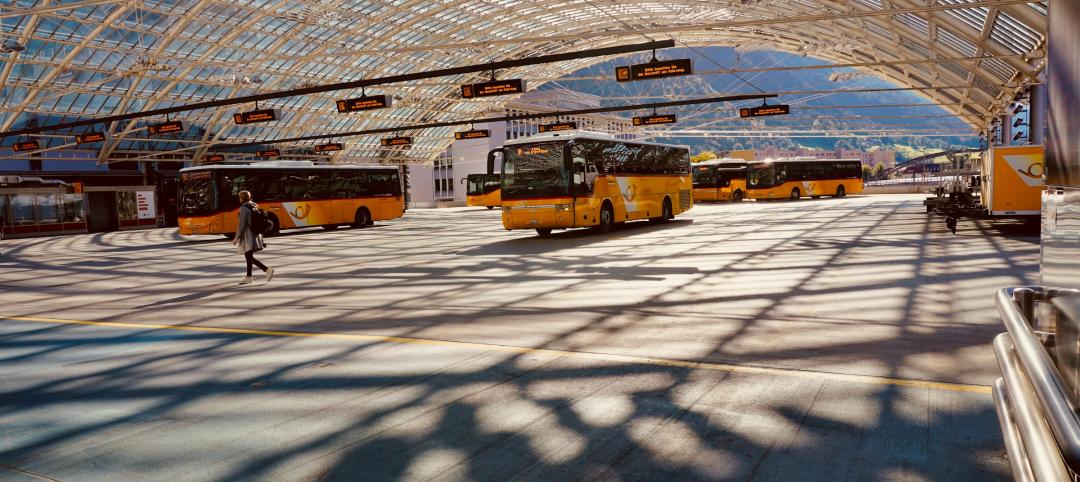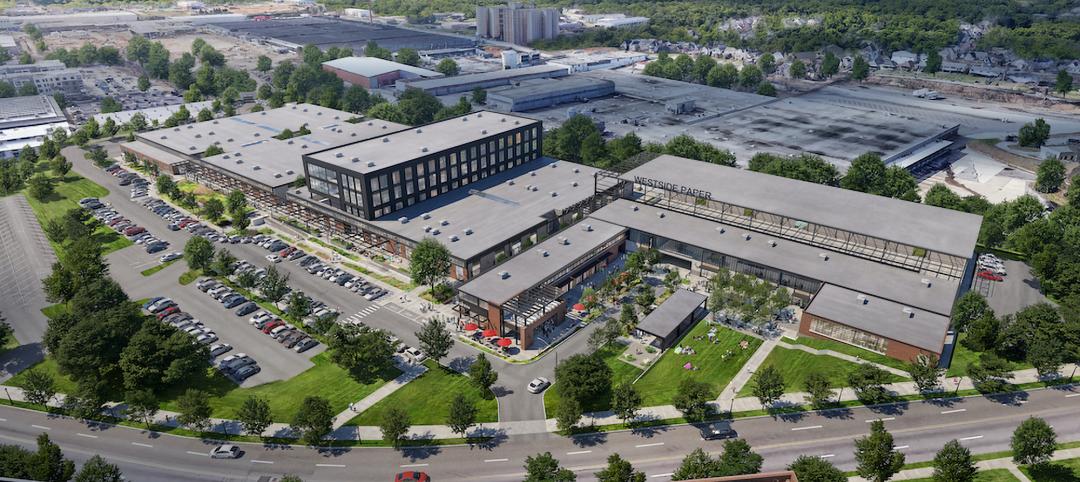RIO DE JANEIRO, Jan 26 (Reuters) - Rescuers on Thursday recovered three bodies from the rubble of three buildings that collapsed in downtown Rio, highlighting the creaky infrastructure of the city that will host the 2014 soccer World Cup and the 2016 Olympics.
The buildings, one 20 floors high, collapsed on Wednesday night in a cloud of dust and smoke just one block away from the city's historic Municipal Theater.
Rescue teams pulled six people alive from the rubble, but at least 16 people were still missing, authorities said. The buildings were mostly used for office space during the day and were almost empty at the time of the disaster.
Rio de Janeiro Mayor Eduardo Paes said the cause of the collapse could have been a structural failure caused by work being done on one of the buildings. He said there was no gas leak that could have caused an explosion.
"The work on one of the buildings could have been the cause. They could have bungled it. That's one hypothesis but it is speculation," Paes told CBN radio broadcaster. "We will investigate this fully, because it is not normal for a building to collapse," he said.
Rio is struggling to address concerns about its decrepit infrastructure, unreliable power supplies and deficient public transportation as it prepares to host global sporting events.
Construction and renovation of 12 stadiums for the soccer World Cup in 2014 is behind schedule and there is concern that Brazil's overcrowded and inefficient airports will be not able to handle masses of sports fans expected to attend the events.
The building collapses come months after an explosion apparently caused by a gas leak ripped through a restaurant in downtown Rio, killing three people and igniting more concern about the state of the city's infrastructure.
In recent months, Rio's inhabitants have had to deal with exploding sewer lines and landslides in the city's slums caused by heavy rain and deforestation.
The collapsed buildings had a bakery and an Itau Unibanco Holding bank branch on the ground floor and were near the headquarters of state-run companies such as oil giant Petrobras and development bank BNDES.
Witnesses said they heard the structures cracking and saw plaster falling before the buildings collapsed, causing panic in the streets and covering parked cars with dust and debris.
"It was like an earthquake. First some pieces of the buildings started to fall down. People started to run. And then it all fell down at once," a witness who identified himself as Gilbert told Reuters.
One man said he was on the 10th floor and ran down the stairs just in time to escape the collapse. BD+C
Related Stories
Industry Research | Jan 23, 2024
Leading economists forecast 4% growth in construction spending for nonresidential buildings in 2024
Spending on nonresidential buildings will see a modest 4% increase in 2024, after increasing by more than 20% last year according to The American Institute of Architects’ latest Consensus Construction Forecast. The pace will slow to just over 1% growth in 2025, a marked difference from the strong performance in 2023.
Giants 400 | Jan 23, 2024
Top 110 Medical Office Building Architecture Firms for 2023
SmithGroup, CannonDesign, E4H Environments for Health Architecture, and Perkins Eastman top BD+C's ranking of the nation's largest medical office building architecture and architecture engineering (AE) firms for 2023, as reported in the 2023 Giants 400 Report.
Giants 400 | Jan 22, 2024
Top 100 Outpatient Facility Architecture Firms for 2023
HDR, CannonDesign, Stantec, Perkins&Will, and ZGF top BD+C's ranking of the nation's largest outpatient facility architecture and architecture engineering (AE) firms for 2023, as reported in the 2023 Giants 400 Report. Note: This ranking includes design revenue for work related to outpatient medical buildings, including cancer centers, heart centers, urgent care facilities, and other medical centers.
Construction Costs | Jan 22, 2024
Construction material prices continue to normalize despite ongoing challenges
Gordian’s most recent Quarterly Construction Cost Insights Report for Q4 2023 describes an industry still attempting to recover from the impact of COVID. This was complicated by inflation, weather, and geopolitical factors that resulted in widespread pricing adjustments throughout the construction materials industries.
Transit Facilities | Jan 22, 2024
Top 40 Transit Facility Architecture Firms for 2023
Perkins&Will, HDR, Gensler, Skidmore, Owings & Merrill, and HNTB top BD+C's ranking of the nation's largest transit facility architecture and architecture engineering (AE) firms for 2023, as reported in the 2023 Giants 400 Report. Note: This ranking includes design revenue for work related to bus terminals, rail terminals, and transit stations.
Hotel Facilities | Jan 22, 2024
U.S. hotel construction is booming, with a record-high 5,964 projects in the pipeline
The hotel construction pipeline hit record project counts at Q4, with the addition of 260 projects and 21,287 rooms over last quarter, according to Lodging Econometrics.
Modular Building | Jan 19, 2024
Virginia is first state to adopt ICC/MBI offsite construction standards
Virginia recently became the first state to adopt International Code Council/Modular Building Institute off-site construction standards.
Office Buildings | Jan 19, 2024
How to strengthen office design as employees return to work
Adam James, AIA, Senior Architect, Design Collaborative, shares office design tips for the increasingly dynamic workplace.
Modular Building | Jan 19, 2024
Building with shipping containers not as eco-friendly as it seems
With millions of shipping containers lying empty at ports around the world, it may seem like repurposing them to construct buildings would be a clear environmental winner. The reality of building with shipping containers is complicated, though, and in many cases isn’t a net-positive for the environment, critics charge, according to a report by NPR's Chloe Veltman.
Adaptive Reuse | Jan 18, 2024
Coca-Cola packaging warehouse transformed into mixed-use complex
The 250,000-sf structure is located along a now defunct railroad line that forms the footprint for the city’s multi-phase Beltline pedestrian/bike path that will eventually loop around the city.

















